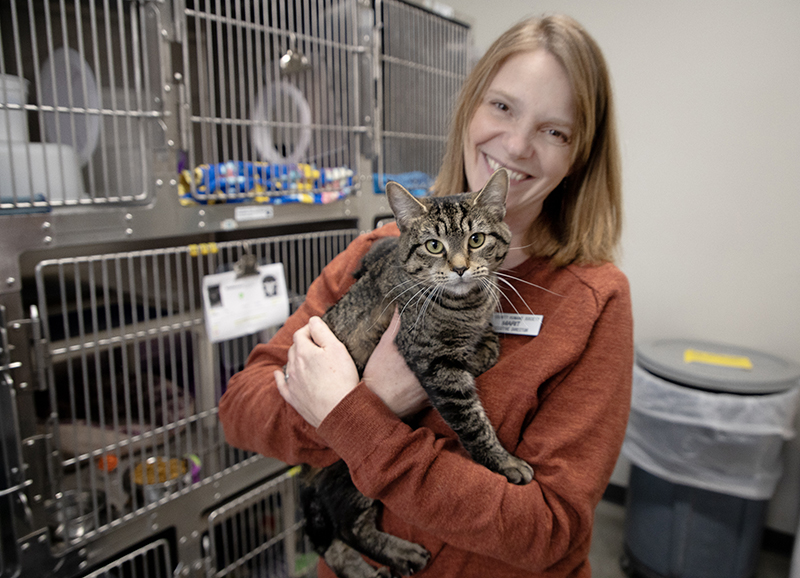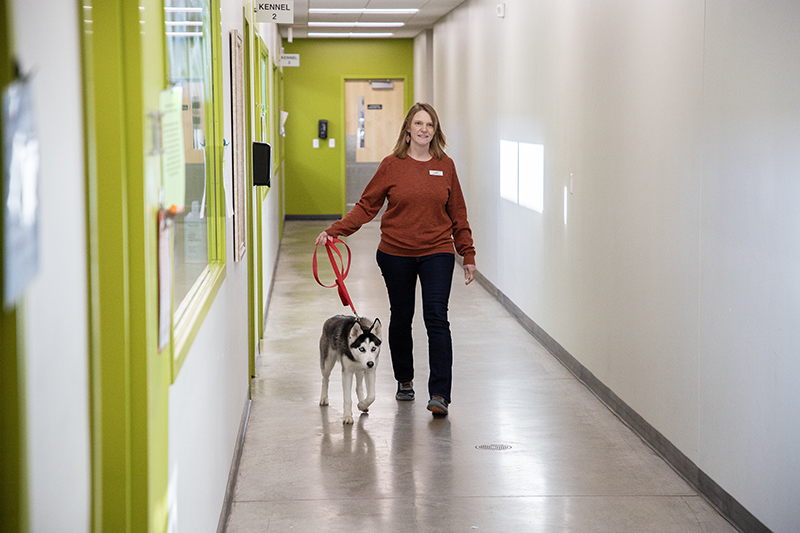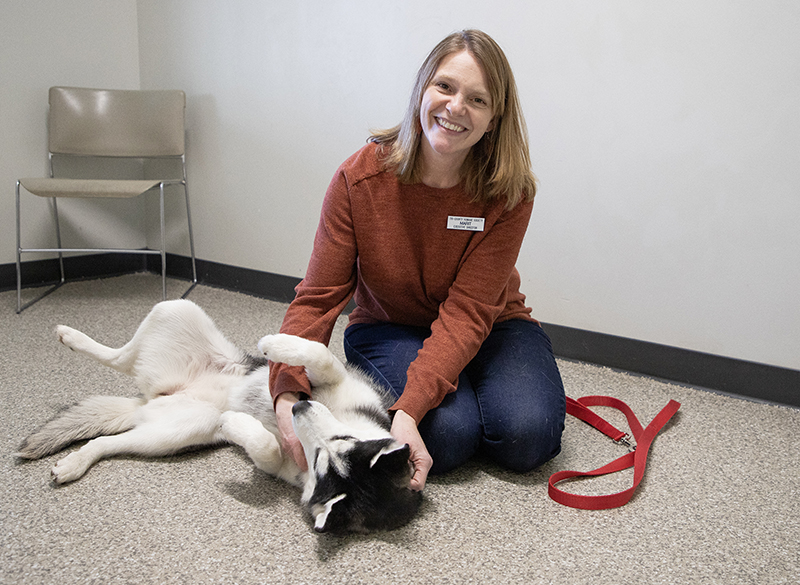Get Involved
Your knowledge, experience and expertise can help students thrive. From supporting them as they decide to come to SCSU to mentoring them as they navigate their next career step.
In 2002, Marit Ortega was looking to take a break from school. She had just earned her degree in biology from St. Cloud State University and moved from part-time to full-time work at the Tri-County Humane Society to gain some more experience before attending veterinary school.
Twenty-two years later, she’s now the executive director.
“I never did apply for veterinary school. I don’t regret it; I never once looked back,” Ortega said. “I stayed here obviously because I love it, and I realized I’ve always been passionate about service — service to the community, service to others — and working here, we’re serving animals, which I love. I always wanted to work with animals, but we’re really mostly serving the community.”
Originally from the St. Cloud area, Ortega said she never planned on staying local. She first started college at the University of Montana, but left after her first semester drained the savings she had from working through high school. She moved back to Minnesota and attended one quarter at Winona State University, but left since it didn’t offer a program in the zoology field she was looking to pursue. Ortega attended SCSU as a fallback, figuring she would get some general courses out of the way before deciding what to do next. She joined the Biology Club while at SCSU, where she first heard about the Tri-County Humane Society.
 “I loved it. It was like the perfect fit,” she said. “It was really, truly the best experience. I made so many really great friendships with that Biology Club. The connection to the Humane Society has literally changed my life. This has become home to me — working here, and I’ve met so many wonderful staff and volunteers and donors and just friends of the shelter through working here. I really do credit it to going to St. Cloud State.”
“I loved it. It was like the perfect fit,” she said. “It was really, truly the best experience. I made so many really great friendships with that Biology Club. The connection to the Humane Society has literally changed my life. This has become home to me — working here, and I’ve met so many wonderful staff and volunteers and donors and just friends of the shelter through working here. I really do credit it to going to St. Cloud State.”
Ortega worked part-time at the Humane Society while attending SCSU. During her schooling she studied abroad one year in Costa Rica on an environmental science and conservation program, volunteered for service trips through the Newman Center, and completed both wildlife internships with now-retired wildlife rehabilitator Linda Peck as well as math and science camps with Peck and her husband: now-retired SCSU biology professor Dr. John Peck. While initially wanting to pursue working with wildlife, Ortega’s work at the Humane Society connected her more with domesticated animals.
“Had I not gone to St. Cloud State, my whole professional career would look so different,” she said. “I can’t imagine not being here now, but I’m very grateful for the people I met at St. Cloud State that guided me into this — into this field and into this particular shelter.”
Initially working as a part-time kennel cleaner and in customer service at the shelter, Ortega moved into a full-time role as the animal care manager following her graduation from SCSU. In that role she essentially gained all the experience of a veterinary technician, as she cared for animals and worked alongside a contracted veterinarian. She built more veterinary assistants into that program during her time in that role, and saw the Humane Society build a surgery suite into that shelter. Ortega then took a brief hiatus from the shelter after getting married and having children as well as fostering children, thinking she should be at home full-time with her kids.
“After six months I learned very quickly that I’m a better mom if I have the professional work side,” she said. “There are some people who are amazing stay-at-home moms; I do better with a full-time job and colleagues that I can work with during the day.”
She returned to the Humane Society, this time in the role of volunteer coordinator. In that capacity she managed volunteers as well as the fostering and humane education programs, and eventually special events and fundraising were added to the position as well. With the shelter expanding and needing more positions added, Ortega gradually transitioned into a role that focused more on the fundraising side.
She would take another break from the Humane Society in 2018, when her alma mater Cathedral High School approached her to help with the capital campaign for a new building. As Ortega was looking to send her children through the same school system, she said the employment change was the right thing for her family at the time, but leaving the Humane Society broke her heart. She worked for Cathedral and the Catholic Community Schools district until 2023, when the shelter’s executive director at the time, Vicki Davis, told Ortega she was retiring and encouraged her to apply for the position. Ortega rejoined the Humane Society in November, and officially became the new executive director Feb. 3, 2024.
 “It was honestly one of the greatest moments. When I left here, I thought I had shut the door to the Humane Society,” she said. “Vicki leaves really big shoes to fill, but I feel like the different positions I’ve held here over the years have really prepared me for being able to lead the organization and continue in Vicki’s legacy that she’s left. It feels good. I feel prepared and I’m happy to be here.”
“It was honestly one of the greatest moments. When I left here, I thought I had shut the door to the Humane Society,” she said. “Vicki leaves really big shoes to fill, but I feel like the different positions I’ve held here over the years have really prepared me for being able to lead the organization and continue in Vicki’s legacy that she’s left. It feels good. I feel prepared and I’m happy to be here.”
Seventy percent of Minnesota residents are pet owners, and with the Tri-County Humane Society building its new facility in 2020, Ortega said it receives just over 5,000 animals a year, and at any given time has around 100 animals in the shelter and 100 more in foster care. While the shelter’s placement rate was around 68 percent when Ortega first started working there in 1998, it now stays between 94 and 96 percent. She encouraged those looking to help animals to support the Humane Society — whether it’s through donating time, money or supplies; fostering animals recovering from a surgery or illness, who need socialization or are too young to adopt out; attending one of the shelter’s annual events or simply sharing one of its social media posts on Facebook, Instagram and TikTok to help adoptable animals find homes.
“We know in our state that pets are an important part of people’s lives,” she said. “There’s clearly still a need for animal shelters and rescues. The impact I hope to have here is to be here for our community, here for the animals that need us. I intend to focus our efforts on our immediate community, but as space allows, we do have good partnerships with other areas in Minnesota, and we have done transports from other states before, too, as we’re able.
“I think our main goal is to continue building that human-animal bond, and providing resources to the community. We’ll see where it takes us.”
While the job comes with a range of emotions due to accepting animals surrendered by distraught owners, adopting animals out to excited new owners, and caring for injured animals, Ortega’s favorite part of the job is the community the shelter has created.
“I truly believe that people who love animals are among the best — the cream of the crop. We are surrounded by those people every day — the people who work here, people who volunteer here, people who donate to the Tri-County Humane Society — there’s such a genuine feeling of camaraderie between the people here and everyone who comes through our doors. That is probably my favorite part: being in this community where we all have this common love for animals and appreciation and desire to help them,” she said. “It’s this place — the people here, our community, too, that … I’ve become rooted in and has stolen my heart, really. It’s amazing, working with this group of people.”

Your knowledge, experience and expertise can help students thrive. From supporting them as they decide to come to SCSU to mentoring them as they navigate their next career step.
Keep up-to-date with the latest news and research from the University, connect with local alumni and attend events, workshops and seminars.
Whether you are making a difference in your community, bringing about change to your industry or shaping the lives of those around you. We want to hear from you.